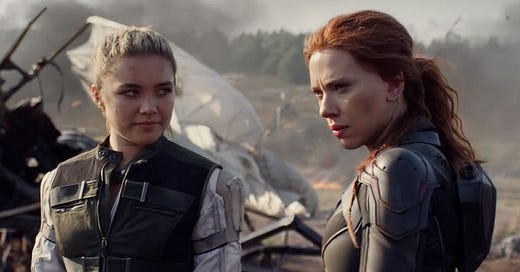Another Take: Black Widow
Though the blammo action stuff is a little stale, Scarlett Johansson finally gets a chance to shoulder her way past the "big Avenger" boys and show subtler shadings for her superspy.
This review is part of our free offerings to subscribers and visitors. Please consider supporting Film Yap through a paid signup to our Substack to receive all our premium content, now at a huge discount!
We’re in an interesting phase of the Marvel Cinematic Universe (MCU) right now, somewhat adrift -- but also open to fresh possibilities.
A decade of carefully interlocking movies culminated with “Avengers: Endgame,” with a number of pivotal characters definitively dying (not just “ashed” and then came back a la the Infinity Stones.) Now they’re turning up in Disney+ streaming shows like “WandaVision” and “Loki” and, with “Black Widow,” the first post-“Endgame” feature film since 2019.
(As you may recall, it was supposed to be released more than a year ago, so absent COVID it would have been out months before those shows.)
How does the movie get around the death of Natasha Romanoff, aka the former Russian superspy Black Widow? That’s easy enough: the story is set five years ago, in the in-between space after “Captain America: Civil War” and before “Infinity War,” when she was on the lam from her own government.
This film is essentially an origin story/reexamination of the character, with star Scarlett Johansson getting a chance to show more color and shadings for Natasha. We saw bits and pieces of them in the movies, but they had to be squeezed in between the big story pieces and male dominance of the MCU.
These are really the best parts of “Black Widow” -- learning about how Natasha morphed from abandoned kid to international heroine, dealing with lingering family schism (more on that in a minute) and exploring her journey from tragedy to redemption. This is a character who has outwardly expressed impervious confidence while hiding enough self-loathing to fill a Dostoevsky novel.
The action scenes are plentiful -- a little too much so, imho -- and can get repetitive, bordering on stale. Of course, we’re dealing with nearly all normal, if exceptional, humans here with a paucity of super powers on display. There’s a self-conscious acknowledgement of this, with someone mentioning to Natasha that she previously enjoyed protection because people were afraid to come after her and risk retaliation from one of the “big Avengers.”
I’m not a big Avenger? she wryly challenges.
Australian director Cate Shortland (“Lore”) comes from an indie background, which probably explains why her character scenes are so compelling and the fighting stuff is a little jumbled. The screenplay by Eric Pearson, with story by Jac Schaeffer and Ned Benson, starts with Natasha as a disaffected preteen in 1995 living in Ohio as part of a family that’s just a spy op cover.
Rachel Weisz and David Harbour play their parents, and will turn up again in the more modern section. She was a brilliant scientist and he was the Red Guardian, a super-strong analogue to Captain America. Weisz does her woman-of-mystery thing to a T, and Harbour has fun playing a loud-mouthed blowhard always ready for fight, the guy who thinks he’s coaching the team when really he’s the mascot.
Florence Pugh is terrific as Yelena, Natasha’s long-lost kid sister, now an adept spy/badass herself. She harbors an ocean of resentment against her more famous sibling, and even coyly mocks the overplayed “superhero jump landing” thing (already dinged in the second “Deadpool”). She brings a jaded Gen Z cool to the table.
Of course, none of them are really related to each other, but they gradually come around to the idea that they’re the closest thing to a family any of them has.
The heavy is Ray Winstone as Dreykov, a Russian mastermind who has been building an army of all-female “Widows” assassins, for which Natasha set the mold. Back in her day they underwent psychological conditioning to break their will, but this new generation is chemically altered to obey. Olga Kurylenko turns up as an especially notable recruit.
I won’t argue that “Black Widow” is one of the best MCU movies. In fact, I’d put it toward the lower end of the pool alongside “Captain America: The Winter Soldier.” It’s got a lot of elements that feel like retreads of earlier S.H.I.E.L.D. stuff, right up to a vertically enhanced headquarters called the Red Room.
But even if the blammo stuff is a little played out, Johansson gets a chance to flex thespian muscles in ways we hadn’t seen before for this character. Will there be another Black Widow movie, a la resurrection or more backstory stuff like this? We’ll see, but it was worth the wait for her to get a chance to shoulder her way past the boys to the front line.





